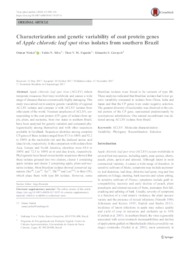Characterization and genetic variability of coat protein genes of Apple chlorotic leaf spot virus isolates from southern Brazil.
Characterization and genetic variability of coat protein genes of Apple chlorotic leaf spot virus isolates from southern Brazil.
Author(s): NICKEL, O.; SILVA, F. N; FAJARDO, T. V. M.; GORAYEB, E. S.
Summary: Apple chlorotic leaf spot virus(ACLSV) infects temperate rosaceous fruit trees worldwide and causes a wide range of diseases that are economically highly damaging. This study was carried out to analyze genetic variability of regional ACLSV isolates and compare it with ACLSV isolates from other parts of the world. Nineteen amplicons of ACLSV, corresponding to the coat protein (CP) gene of isolates from apple, plum, and nectarine, from two states in southern Brazil, have been analyzed for genetic variation and compared phylogenetically among themselves and with other sequences available in GenBank. Sequences identities among complete CP genes of these isolates ranged from 87.5 to 100% and 92.2 to 100% at the nucleotide (nt) and the deduced amino acid (daa) levels, respectively. In the comparison with isolates from Asia, Europe and North America, identities were 68.4 to 100% and 72.5 to 100% at nt and daa levels, respectively. Phylogenetic trees based on nucleotide sequences showed that these isolates grouped into two clusters, cluster 1 containing apple isolates and cluster 2 comprising apple, plum and nec- tarine isolates. Most Brazilian isolates showed conserved signatures (Ser 40 ,Leu 59 ,Tyr 75 ,Thr 130 and Leu 184 )intheirCPs, which place them with type B6 isolates. However, some Brazilian isolates were found to be variants of type B6. These analyzes indicated that Brazilian isolates had lower genetic variability compared to isolates from China, India and Japan and that the CP genes were under negative selection. The greatest diversity of nucleotides was observed in the central portion of the CP gene, represented predominantly by synonymous substitutions. One natural recombinant was detected among ACLSV isolates from Brazil. Keywords ACLSV . Molecular characterization. Variability. Phylogeny. Recombination. Selection.
Publication year: 2018
Types of publication: Journal article
Unit: Embrapa Grape & Wine
Observation
Some of Embrapa's publications are published as ePub files. To read them, use or download one of the following free software options to your computer or mobile device. Android: Google Play Books; IOS: iBooks; Windows and Linux: Calibre.
Access other publications
Access the Agricultural Research Database (BDPA) to consult Embrapa's full library collection and records.
Visit Embrapa Bookstore to purchase books and other publications sold by Embrapa.

